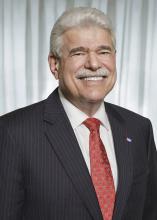What’s an affiliate?
Part of the problem is the ambiguity surrounding the many different relationships among top-ranked cancer hospitals and associated institutions, said J. Leonard Lichtenfeld, MD, interim chief medical officer for the American Cancer Society. In some cases, the primary institution is closely aligned with an affiliate, sharing staff and collaborating on patient cases. In other instances, a reputable hospital offers its brand to a hospital in a distant location, and the relationship is more marketing and information-sharing based.
“Just because a name shows up on a building, doesn’t necessarily mean the same level of care is being provided at an affiliated institution,” Dr. Lichtenfeld said. “There are factors that neither you nor me can look into to determine how close the affiliation is. Sometimes, it can be a very tight relationship. Sometimes it can be a loose relationship, and it’s very hard to figure that out.”
In a survey of 1,010 patients, 94% of respondents felt that cancer care at a smaller hospital would improve after affiliating with a larger hospital specializing in cancer, and most patients expected physicians at the larger hospital to be involved considerably in the care of patients at the smaller hospital after affiliation (JAMA Oncol. 2018;4[7]:1008-9).
In another survey, 85% of patients said they would rather travel an hour for complex surgery at a larger hospital specializing in cancer, rather than a smaller local hospital. However, if the smaller hospital was affiliated with a top-ranked cancer hospital, 31% of respondents changed their preference to the smaller hospital, according to the analysis (Ann Surg Oncol. 2019 Mar;26[3]:732-8).
When asked to compare leading cancer hospitals and their smaller affiliates, 47% of respondents said they felt that surgical safety would be the same at both hospitals, 66% said that guideline compliance would be the same, and 53% of patients said they believed that cure rates would be the same at both institutions.
“A majority of the public feels when the brand is shared between a top-ranked hospital and a hospital in the community, the quality and safety is the same,” said Dr. Boffa, a coauthor of both survey studies. “The advertising differs for each affiliate, but there are certainly instances where the messaging can be misinterpreted. There are instances where there are billboards and advertisements where the implication is the community hospital to some degree has care that is similar to the main hospital.”
Hospitals: Collaborations beneficial
For the University of Wisconsin–Madison (UW) Carbone Cancer Center, its relationships with several community institutions have enhanced consistency among physician teams and provided new care opportunities for patients, said Dan Mulkerin, MD, regional director of UW’s regional cancer center network. Carbone includes 12 locales of service and four affiliates in various stages of maturity.
In some cases, UW physicians travel to the affiliate to help care for patients but refer surgeries back to the main institution. In other cases, UW surgical specialists operate jointly with local surgeons at the community hospital, according to Dr. Mulkerin.
The surgical safety of affiliates is an issue that UW started to address about 5 years ago, he said.
“We recognized that this was a potential area of concern for our cancer programs and we started incorporating surgical oncology into our affiliate structure,” Dr. Mulkerin said. “We look at the quality outcomes of our partners on a quarterly basis. That drives our approach about which types of surgery gets triaged to come to the main institution and which types of surgeries can appropriately be done in community settings under our brand, and under our guidance.”
At H. Lee Moffitt Cancer Center & Research Institute, physicians travel from the headquarters to its partner hospitals to deliver care and work with doctors at each site. For example, Moffitt leaders are overseeing a program with Memorial Healthcare System in South Florida that focuses on malignant hematology and blood and marrow transplantation, said Louis Harrison, MD, chair for Moffitt’s radiation oncology department and vice president, chief partnership officer.
“These are real partnerships where we put our faculty and our know-how on the ground at these sites,” he said in an interview. “We feel like the only way to deliver care that is representative to Moffitt is to have Moffitt doctors deliver the care.”
The University of Texas MD Anderson Cancer Center, Houston, meanwhile, boasts a robust network of partner members, certified member hospitals, associate members, and affiliates. Partner members are U.S.-based relationships where member health systems integrate their clinical cancer care operations with MD Anderson, said Michael Kupferman, MD, senior vice president of clinical and academic network development at MD Anderson. Certified members receive assessments by MD Anderson and tailored recommendations for clinical quality improvements, while associate members stem from international clinical relationships with MD Anderson. Affiliates have a relationship with MD Anderson in one specialty- or modality-focused area, such as radiation oncology.
“All MD Anderson Cancer Network members operate independently from MD Anderson Cancer Center,” Dr. Kupferman said in an interview. “All cancer network members have access to our expertise and clinical knowledge to improve the level of cancer care in their communities.”
In terms of marketing the different types of network members, Dr. Kupferman said that MD Anderson collaborates with members on internal and external marketing and communications strategies to offer “best practices and guidance on how to best educate the alignment and benefits of the relationship to internal staff and local communities.”
Dr. Kupferman declined to directly comment on how surgical safety at MD Anderson’s member institutions is addressed or respond to the JAMA study findings. “We believe that our cancer network members strive to practice at a level higher than the national safety average, as evidenced by the consistent quality reviews we conduct with our members.”




